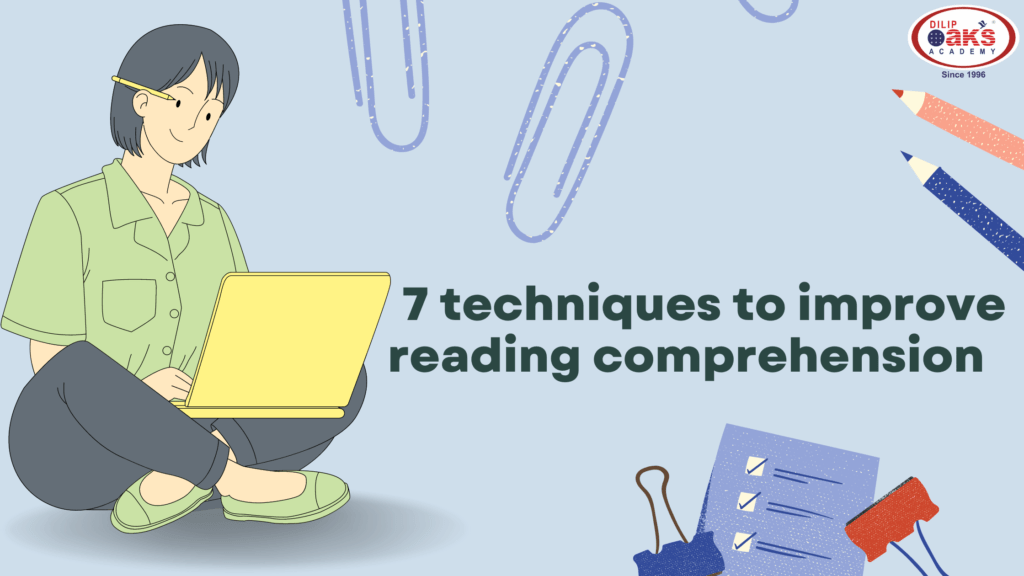
“Reading” may not be one of your hobbies, but it is an important skill to grow. Therefore, even if you get scared or bored by looking at the long black text, somehow you have to develop a knack for effective reading. The more you read and practice, the easier it will be for you to comprehend what you are reading. Here are the seven straightforward techniques to improve your GRE reading comprehension abilities:
1. Increase vocabulary power
When you understand the meaning of the words you read, it can be easier for you to grasp the author’s perspective. You can improve your vocabulary by developing a habit of active reading. You can mark the difficult words and phrases that you come across while reading and search for their meaning in the dictionary. Once you understand the meaning of words, use it in your own language and try to use it in different contexts. This will aid in your long-term retention of those words.
2. Ask questions regarding the text you are reading
As you become more immersed in the text, asking questions about what you are reading can help you become a better reader. In order to gain a deeper understanding of what you are reading, consider themes, motifs, and other aspects of the text that you may have overlooked.
You can ask yourself the following questions as you read:
- Why did the author choose to start the book that way?
- What sort of bond do these two characters have?
- What do we now know about the protagonist of the story?
- Are there any recurring themes throughout the book? If so, what do they mean?
Click here for tips to master Text Completion and Sentence Equivalence and here to learn about mastering the GRE Quantitative Reasoning section.
3. Visualize the content
Creating mental images related to the content can aid in reading comprehension for GRE. Imagine that you’re watching a movie in your mind while you read. Picture the characters, places, and events described in the text. When you visualize what you’re reading, it’s like bringing the words to life! This technique helps you understand and remember the ideas better because you can see them in your imagination. So, next time you’re reading, try to make pictures in your mind to help you understand the content more easily!
4. Make use of situational cues
Even if you are unfamiliar with all the words being used, using context clues can really help you grasp what you are reading. The words and sentences that precede and follow the unfamiliar word can provide context cues. By concentrating on the major words or concepts in a sentence, you can use context clues to infer the sentence or paragraph’s core theme. Additionally, you can search for neighboring terms that are either synonyms or antonyms of the unknown word.
5. Identify the core idea
You can evaluate the relevance of an article by finding the main idea in a paragraph. Understanding the significance of what you’re reading may help you better understand the author’s perspective. After reading every paragraph, stop reading and try to figure out what the major point is. Then, for even better understanding, try to rephrase the primary idea in your own words.
6. Summarize the information you read
Writing a summary is a foolproof method to learn more about what you have read. In order to summarize, you must first determine what is crucial in the text and then express it in your own terms. Summarizing enables you to assess your comprehension of the text and improves your long-term retention of what you have read.
7. Diversify your reading materials
Try reading different kinds of books, articles, and stories. Each type of writing has its own style and way of presenting information. By exposing yourself to different genres and topics, you’ll become familiar with various writing styles, vocabulary, and ideas. This exposure broadens your understanding of language and context, making it easier for you to understand different types of texts. So, try to mix up what you read to improve your reading skills and learn new things along the way!
As India’s leading Study Abroad Consultant, Dilip Oak’s Academy offers a comprehensive suite of admission counseling services that can guide you through the entire process from Shortlisting Universities to Visa Counseling. With our expertise, we have successfully sent 32,000 students to various prestigious American universities like MIT, Stanford, Cornell, and Carnegie Mellon. We also offer classroom and online coaching for GRE, TOEFL, and IELTS, as well as GRE Self Prep. To explore our services, book a free consultation or call us at 91-20-67444222.
